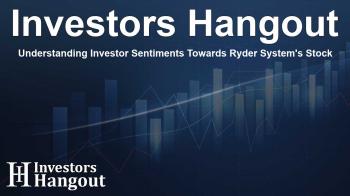Understanding Investor Sentiments Towards Ryder System's Stock

Investor Insights on Ryder System's Short Selling Trends
Ryder System (NYSE: R) has recently seen a decline in its short interest percentage by 9.05%. Currently, there are approximately 1.21 million shares sold short, representing 3.92% of the company's total shares available for trading. To put this into perspective, it would take traders about 4.51 days to cover their short positions on average based on the current trading volume.
Why Understanding Short Interest is Important
Short interest refers to the shares that have been sold short yet remain unpurchased to settle those trades. This tactic involves selling stocks that the trader does not own, with the anticipation that the stock price will decrease. Essentially, a trader profits by selling high and buying low. If the stock price rises instead, the trader incurs losses.
Tracking short interest is crucial since it serves as an indicator of investor sentiment towards a particular stock. A surge in short interest can suggest that investors are growing more pessimistic, while a drop can imply a shift towards a more optimistic outlook.
Visualizing Ryder System's Short Interest Decline
A visual analysis of the trend in Ryder System's short interest for the past three months reveals a consistent decline. Though this decrease does not guarantee a rise in stock price soon, it highlights that fewer shares are currently being shorted, which could suggest a stabilizing sentiment among investors.
Comparing Ryder System with Its Industry Peers
Analyzing the short interest of Ryder System in comparison to its peers provides valuable insights. Comparing similar companies—those in the same sector with analogous characteristics—helps in gauging relative performance. According to industry experts, Ryder System's average short interest as a percentage of float is 5.94%, indicating it has less short interest than the majority of its competitors.
Interestingly, while one might assume increasing short interest signals a negative outlook, it can indeed be viewed as bullish in some scenarios. This perspective emphasizes that an uptick in short selling can prompt a potential short squeeze, leading to price increases when more traders are forced to cover their short positions.
Market Trends and Ryder System
As the market landscape evolves, understanding Ryder System's positioning is essential. The company continues to adapt and respond to market dynamics, focusing on enhancing its operational efficiencies while navigating factors such as consumer demand and economic conditions. Staying informed about such strategies and their potential impacts on stock performance is crucial for investors.
Future Expectations and Considerations
Looking forward, investors should keep a watchful eye on Ryder System's performance indicators, market trends, and how external factors such as economic shifts might influence the company's operational results. Given the complexities of market interactions, being prepared for fluctuations and understanding the underlying reasons can enable better decision-making.
Frequently Asked Questions
1. What does short interest mean in the context of stocks?
Short interest indicates the number of shares sold by investors who expect the stock price to drop. It reflects market sentiment regarding future price movements.
2. How is Ryder System's short interest trend significant for its investors?
A decreasing short interest may suggest increased investor confidence in the stock, while higher short interest can indicate bearish sentiment.
3. How does Ryder System compare to its industry competitors?
Currently, Ryder System has lower short interest compared to the industry average, indicating more favorable investor sentiment than many peers.
4. What should investors consider when analyzing short interest?
Investors should consider the reasons behind short interest movements, market conditions, and the potential for short squeezes that may affect stock prices.
5. What future trends might affect Ryder System's stock performance?
Investors should watch for economic shifts, regulatory changes, and industry trends that may impact Ryder System's operations and financial performance.
About The Author
Contact Henry Turner privately here. Or send an email with ATTN: Henry Turner as the subject to contact@investorshangout.com.
About Investors Hangout
Investors Hangout is a leading online stock forum for financial discussion and learning, offering a wide range of free tools and resources. It draws in traders of all levels, who exchange market knowledge, investigate trading tactics, and keep an eye on industry developments in real time. Featuring financial articles, stock message boards, quotes, charts, company profiles, and live news updates. Through cooperative learning and a wealth of informational resources, it helps users from novices creating their first portfolios to experts honing their techniques. Join Investors Hangout today: https://investorshangout.com/
The content of this article is based on factual, publicly available information and does not represent legal, financial, or investment advice. Investors Hangout does not offer financial advice, and the author is not a licensed financial advisor. Consult a qualified advisor before making any financial or investment decisions based on this article. This article should not be considered advice to purchase, sell, or hold any securities or other investments. If any of the material provided here is inaccurate, please contact us for corrections.

